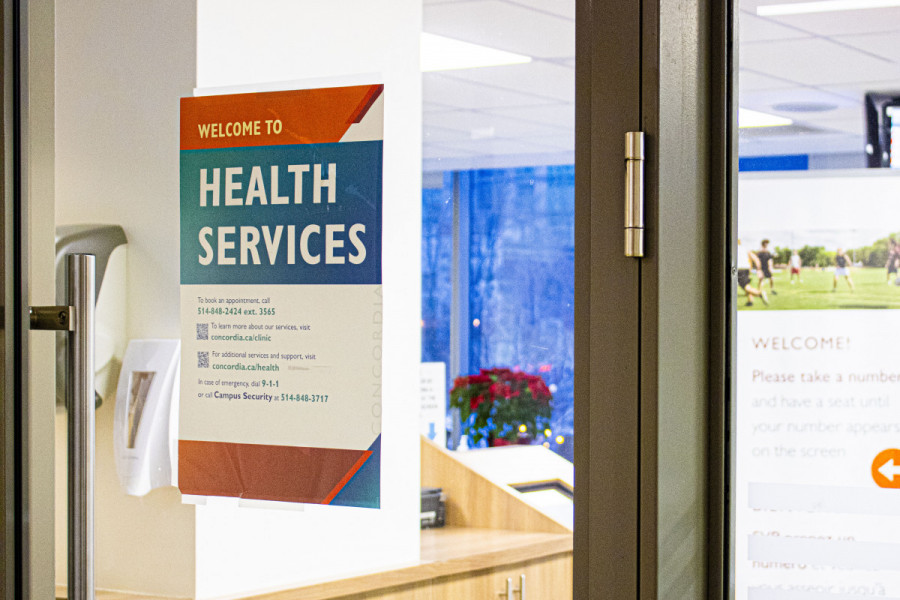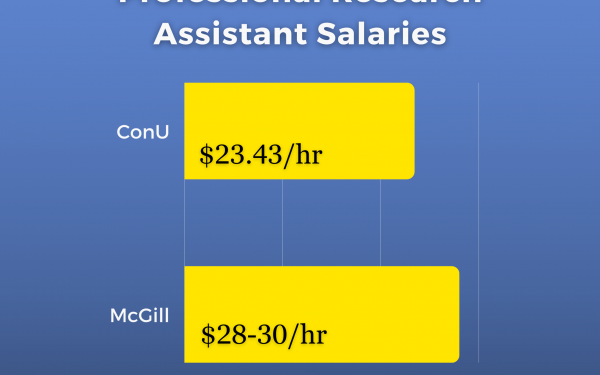Better feedback avenues for CHS in the works
Two students working on creating feedback form for Concordia Health Services after personal negative experiences
In 2019, Cory Shallow, a Concordia University student, visited Concordia Health Services (CHS) due to an allergic reaction.
She asked CHS for an appointment with an allergist. However, according to Shallow, the CHS doctor refused and instead sent Shallow for an evaluation for Gastroesophageal reflux disease (GERD). The assessment included inserting a tube up Shallow's nostril and into her stomach. The tube was attached to a monitor bigger than a Sony Walkman and had to be kept there for 24 hours.
Shallow described the experience as invasive. Due to complications, Shallow went back to CHS to get the tube removed.
"My throat was closed. It was kind of terrifying for hours, as the tube [kept] moving. [The] tube [...] was grinding against the irritated, swelling tissue of my throat," she said. "Literally, one of the most traumatic, painful days of my life."
When she went back to CHS, Shallow claimed that the nurses refused to remove the tube due to their fear of being held liable.
Abandoned by the services she pays for in her tuition, Shallow walked to the Jewish General Hospital. However, due to its long waiting times, she hailed a cab and went to the Glen Centre for Specialized Medicine. When the medical professionals in the GERD department noticed Shallow's condition, "they yanked the tube out of me, and it was stuck because I was so swollen," she said.
After her experience with CHS, Shallow demanded that the CHS doctor would never be assigned to her in the future.
Shallow is one of many students who have had negative experiences with CHS.
In 2019, Sarah Richman had an incident with a CHS doctor, leaving her feeling dissatisfied and dismissed.
Some time later, Richman posted a social media callout to see if others had similar experiences with the same doctor. She was met with a flood of responses that echoed hers. This is how Richman met Shallow. The two had both felt as if they had experienced malpractice from the same doctor and joined forces as co-complainants to ultimately fight for every person who replied to Richman's post.
These messages led Richman to make a formal complaint. She emailed a detailed letter to the head of CHS about what could be done to prevent this from happening in the future. After being presented with no adequate solutions, she submitted her complaint to the Collège des médecins du Québec and waited a year, only for her complaint to be rejected. When Richman felt ready to give up, Shallow encouraged her to take her case to the Concordia Student Union’s (CSU) Advocacy Centre. They then tried to get the attention of the Office of Rights and Responsibilities (ORR). ORR turned them away after asserting it only handles professor-related and educational complaints; CHS complaints must be managed through a separate entity.
The two had hit a roadblock, and Richman had gone full circle in her complaint process. Student advocacy had set Shallow and Richman up with an appointment with Elana Bloom, Concordia’s director of Campus Wellness and Support Services.
The entire complaint process took Richman over three years. During her persistent attempt to get a sufficient response to her complaint, she found no formal complaint process for CHS. What was first a quest to obtain justice for herself and others mistreated by this doctor at CHS has now shifted to a desire to work with the administration. She aimed to create a document that simplifies receiving feedback from students and simplifies the process of students giving feedback.
According to Richman and Shallow's recollection and notes transcribed by Shallow during the meeting with Bloom, they discussed their prolonged complaint process, how complaints concerning CHS are addressed and a feedback form that aims to correct the current feedback procedure. The two shared with The Link that they received a green light from Bloom for a plan to collaborate on the proposed feedback form.
Richman's motivation to mobilize the creation of the form came from her turmoil. "I don't want people to go through the shit that I went through," she said.
The Link met with Bloom to discuss CHS and the potential creation of a feedback form. Although she claimed to have not spoken to any student about said form, she said that CHS is open to improving services for students and collaborating on its construction.
Ideally, the form will be used by students immediately following their appointment at CHS as a general inquiry into how the student's services went.
Shallow has been transcribing for the Access Centre for Students with Disabilities for nearly eight years and studied qualitative research under Dr. Theresa Bianco, the former undergraduate program director of psychology. With these skills, Shallow will dedicate herself to interviewing subjects and collecting, transcribing and analyzing data. Shallow will then make a code sheet for each interview and aggregate the data to reveal common dynamics, highlighting perceived strengths and weaknesses in CHS.
With this form, they hope to provide the administration with malleable feedback and promote a paper trail so that feedback is centralized and turned into data more efficiently. Currently, any student who has a complaint with CHS must chat directly with either Bloom, a manager or receptionist at the CHS. To alleviate CHS's busy schedule, the duo is "trying to make it as easy as possible for them, so we are not adding something else to their already full plate," Richman said.
Bloom explained that all information regarding patients is privileged medical information, and the CHS does not "divulge any information without the patient's permission."
An access-to-information request filed by The Link revealed only 19 complaints were filed to CHS from 2018 to 2024, as Concordia only started recording CHS complaints in 2018.
Seven of the complaints are about CHS doctors, three are complaints regarding nurses, one complaint about students’ dissatisfaction with how they were treated, and eight are complaints about the accessibility of CHS.
To spread the word, Richman created a QR code for students to scan and get involved with their Discord. The Discord is a space for students to talk about their experience with CHS and potentially schedule an interview with Shallow. It is meant to be a safe online space for students to share their stories and learn about other resources on campus.
"It doesn't matter if they are on the Discord to lurk, it doesn't matter if they are on the Discord to talk; whatever it is, as long as they are there, they are helping," Richman said.
To create a sufficient sample size, Shallow hopes to interview at least 20 students from diverse medical backgrounds to get as accurate a sample size as possible.
The whole process is entirely anonymous. The duo doesn't ask for names; the only verification needed is a screenshot of the student's Moodle page or schedule.
"We want this to be well-rounded and to be based in as many experiences as possible so that it can be as effective as possible," Richman said.
To make an appointment for an interview with Shallow, the student has to mention the admin on Discord and schedule an appointment that is most convenient for them, which would take less than ten minutes.
Students who don't feel comfortable being interviewed can also use the Discord to chat.
Once they have achieved the ideal sample size and created their research form, they will present it to Concordia. The university will then be able to tweak and adjust the form before implementing it.
Although the duo is eager to collaborate with the administration, they describe the CSU as open to incorporating the form into their annual undergraduate survey should Concordia turn down the form. "At the end of the day, we are trying to help Concordia," Richman said.
According to Tanou Bah, the student life coordinator at the CSU, adapting the feedback form would be another way to reach students. “In the past, the CSU has done investigations of student services, to see if they are meeting students’ needs,” said Bah. “We are happy to hold [the feedback form] and present it on behalf of students to health services and the administration.”
If students want to share their stories to help the duo create the feedback form, they can join the ConU Health Caucus Server on Discord or use the QR code.
A previous version of this article stated that Elana Bloom is the director of Health and Wellness. That statement was incorrect. Bloom is the director of Campus Wellness & Support Services. The Link regrets this error.
This article originally appeared in Volume 44, Issue 10, published February 13, 2024.







_(1)_600_375_s_c1.png)